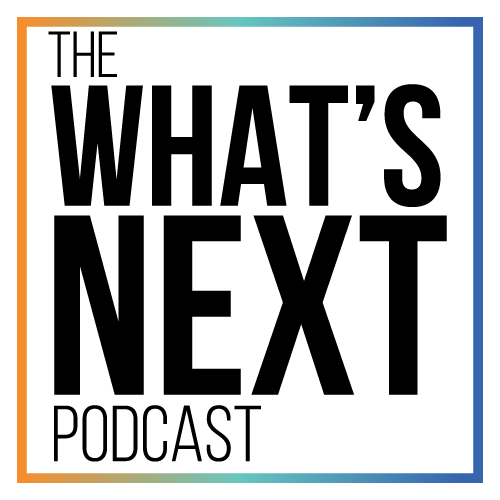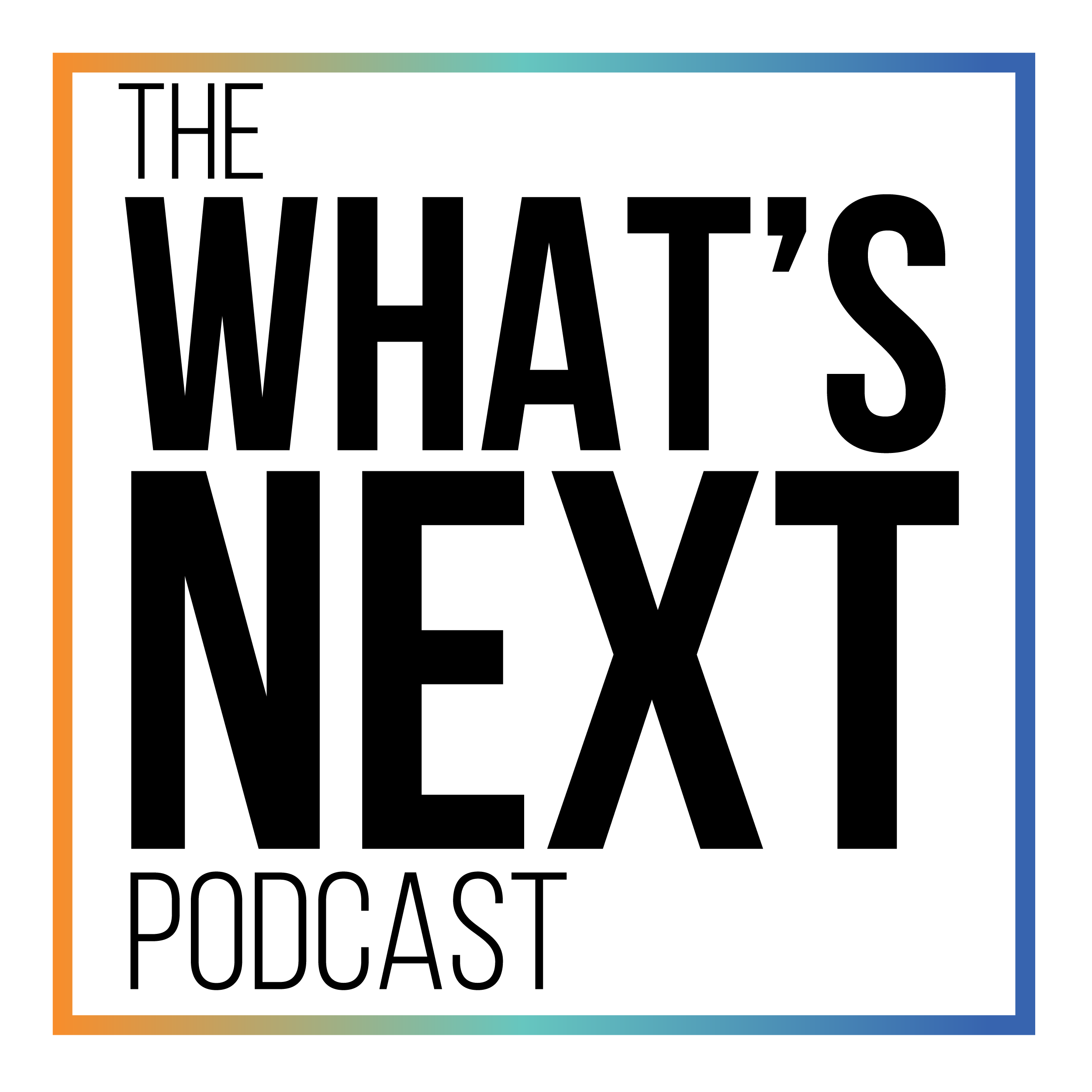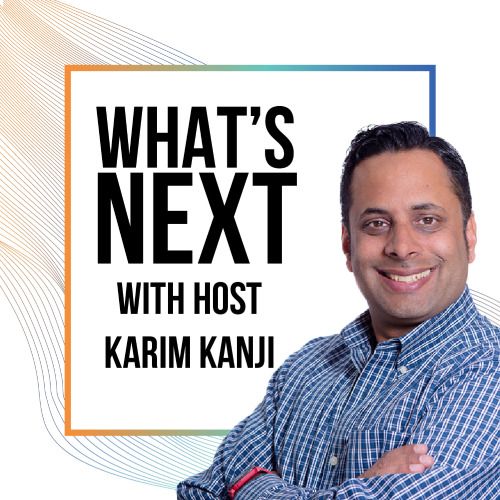Episode 8
What's Next with Steve Dennis
We speak to Steve Dennis, author of 'Remarkable Retail How to Win & Keep Customers in the Age of Disruption'.
Steve gives us an overview of the retail industry; the impacts of shopping mall oversupply, lack of diversified shopping experiences and the evolution of e-commerce. Steve also takes us through 'The 8 Essentials of Remarkable Retail', a framework that guides brands in the design of enduring, highly profitable and intensely customer-centric growth strategies.
**ABOUT STEVE DENNIS**
Steve Dennis is a leading global retail influencer, keynote speaker & consultant, Senior Forbes Contributor, and bestselling author, ‘Remarkable Retail'
Steve Dennis is a consultant, keynote speaker and author focused on retail growth and innovation. He has been named a top global retail influencer by multiple organizations and his thoughts on the future of shopping are regularly shared in his role as a Forbes Senior Contributor. His new best-selling book is "Remarkable Retail: How to Win & Keep Customers in the Age of Digital Disruption" and he is the host of the Remarkable Retail podcast.
During a 30 year career as a senior executive at two Fortune 500 retailers–and more recently as a strategic advisor–Steve has worked with dozens of retail, consumer, luxury and social impact brands to inspire, catalyze and design their journey to remarkable results.
As a sought-out keynote speaker, Steve has delivered talks on six continents, sharing his unique perspective on what it takes to reignite customer growth in a world of constant change and shifting consumer preferences.
He has contributed commentary to Bloomberg/Business Week, the BBC, CNBC, CNN, the Harvard Business Review and the Wall Street Journal, among many others.
Steve is currently the President of SageBerry Consulting. Prior to founding SageBerry, he was the chief strategy officer and SVP, multichannel marketing for the Neiman Marcus Group.
Steve received his MBA from Harvard and a BA from Tufts University.
**FOLLOW STEVE**
stevenpdennis.com
twitter.com/stevenpdennis
www.linkedin.com/in/stevenpdennis/
-------------------------------------------------------
**FOLLOW US**
INSTAGRAM - www.instagram.com/activeintworld
TWITTER - twitter.com/ActiveIntlUK
LINKEDIN - www.linkedin.com/company/active-international-uk
KARIM - twitter.com/karimkanji
PODCAST WEBSITE - www.thewhatsnextpodcast.com
Transcript
- [Steve] Well, hi, I'm Steve Dennis.
Speaker:I'm a consultant, author and speaker
Speaker:on retail strategy and innovation.
Speaker:I've been in the retail industry a really long time.
Speaker:I don't really like to talk about it.
Speaker:And I'm also the author of "Remarkable Retail,
Speaker:How to Win & Keep Customers
Speaker:in the Age of Digital Disruption."
Speaker:- [Karim] Thank you, Steve, for joining me today.
Speaker:- [Steve] Thanks for having me.
Speaker:- [Karim] So, the book, "Remarkable Retail"
Speaker:it's coming out at a...
Speaker:It's very timely,
Speaker:obviously not only over the past number of years,
Speaker:have we had a growth in e-commerce,
Speaker:but this pandemic has really changed people's buying habits.
Speaker:And I know one of them has been and I know many people
Speaker:have taken advantage of calling up or going online
Speaker:and ordering groceries or whatever the case may be.
Speaker:And then picking them up curbside, right?
Speaker:There's this curbside pickup phenomenon
Speaker:that we've been seeing this year.
Speaker:And you mentioned...
Speaker:You obviously mentioned that in your book,
Speaker:but you also mentioned in your book about the customer
Speaker:is the channel.
Speaker:And you do reference consumers picking up groceries
Speaker:or shopping curbside.
Speaker:And I'm wondering if you could explain more
Speaker:about this customer as the channel thing.
Speaker:- [Steve] Yeah, well, one of the biggest mistakes
Speaker:that a lot of retailers have made over the years
Speaker:not just during the pandemic is thinking of e-commerce
Speaker:and brick and mortar as largely distinct operations.
Speaker:And I think what the pandemic has done is number one,
Speaker:really reinforced the idea and accelerated the stats
Speaker:around how consumers start most shopping journeys
Speaker:in a digital channel even though the vast majority
Speaker:of those digital shopping journeys
Speaker:end up involving a store in some way.
Speaker:But in particular what happened with the pandemic
Speaker:is yes, we saw more kind of traditional e-commerce growth,
Speaker:but we saw a lot more of this behavior
Speaker:where stores are involved in what people call e-commerce.
Speaker:So that's the curbside pickup that's buy online
Speaker:or return to store.
Speaker:It's online orders that are fulfilled by stores.
Speaker:So if anything, it's actually
Speaker:kind of ironically turned out that stores are going to be
Speaker:even more important for a lot of retailers,
Speaker:even though we've obviously seen
Speaker:a growing shift to e-commerce.
Speaker:But you know that shift to e-commerce
Speaker:has been going on for 15 years.
Speaker:Like that in itself is not new.
Speaker:- [Karim] Yeah.
Speaker:- [Steve] So the idea of the customers as the channel
Speaker:is not to think about e-commerce versus brick and mortar,
Speaker:it's to say, well, it's the focus on the customer
Speaker:and our job is to figure it out how to reduce the friction
Speaker:between shopping across those channels
Speaker:but more particularly really elevate that experience
Speaker:and in away that is truly remarkable,
Speaker:which is really the thrust
Speaker:and underlying principle in my book.
Speaker:- [Karim] And previous to this pandemic,
Speaker:the discussion around e-commerce has always been
Speaker:e-commerce will grow at the detriment of bricks and mortar
Speaker:but I think we've seen that one sort of needs the other.
Speaker:E-commerce for grocery stores,
Speaker:at least here in in Canada and in Toronto
Speaker:needs the grocery stores in the neighborhoods
Speaker:to fulfill that.
Speaker:- [Steve] Yeah I...
Speaker:Right. Oh, I'm sorry.
Speaker:Go ahead.
Speaker:- [Karim] No, so I was wondering whether or not
Speaker:you had always thought in this way
Speaker:and whether this will continue even post-pandemic?
Speaker:- [Steve] So I think couple of things are going on there
Speaker:that's important.
Speaker:One is there's an aspect of online,
Speaker:which e-commerce and sort of,
Speaker:I hate to say traditional e-commerce
Speaker:'cause that sounds a little bit funny,
Speaker:but if you think about e-commerce,
Speaker:at least in its early days,
Speaker:it was sort of a better catalog,
Speaker:mail order catalog business.
Speaker:It basically use technology to automate ordering
Speaker:but the basic fulfillment was very similar
Speaker:to what catalog company has been doing forever
Speaker:which is to pick, pack and ship a product
Speaker:in the central distribution location and mail it to you.
Speaker:I think that was e-commerce
Speaker:that has been the bulk of Amazon's business for example
Speaker:other than digital downloading.
Speaker:So that sort of e-commerce is really great
Speaker:for certain kinds of products,
Speaker:largely around where it's just convenient to order it online
Speaker:and have it show up at your home or office.
Speaker:So, and that part of e-commerce for the most part,
Speaker:doesn't really involve a store.
Speaker:You may go to a store to check out the product
Speaker:and order online,
Speaker:but a lot of e-commerce and particularly
Speaker:what's happened in the last several years
Speaker:and really accelerated by the pandemic
Speaker:has involvement from the store
Speaker:because the customer is either going there
Speaker:to talk to a sales associate or get ideas
Speaker:or put an outfit together or whatever and or I guess,
Speaker:the store has a role in fulfilling that order.
Speaker:So it's been going on and I think just generally people
Speaker:have been a little bit too black and white
Speaker:about talking about e-commerce and the main thing
Speaker:is really blended altogether.
Speaker:The kind of pure e-commerce
Speaker:for the most part doesn't really exist.
Speaker:Even some of these newer brands that started online
Speaker:they're all opening stores
Speaker:because they realized that there's a big aspect
Speaker:of commerce that is a merger or a hybrid
Speaker:of physical and digital.
Speaker:- [Karim] I know e-marketer recently was talking
Speaker:in one of their episodes about the future of shopping malls.
Speaker:And so when you think of adjusting
Speaker:a black and white framework you think,
Speaker:"Okay, shopping malls are going to end,
Speaker:no need to go into store and walk around and stuff."
Speaker:But I'm curious whether there's a reinvention
Speaker:of shopping malls when to keep this in mind.
Speaker:- [Steve] Well, I hope so.
Speaker:I think, again, there's a little bit of the devil
Speaker:in the details.
Speaker:I mean- - [Karim] sure.
Speaker:- [Steve] Shopping malls have been losing...
Speaker:I mean, well, one in the US in particular,
Speaker:but I know in Canada in some other markets,
Speaker:there was a real boom in building shopping markets
Speaker:and shopping malls and shopping centers
Speaker:for the past 20 years.
Speaker:And so one of the things that happened in general
Speaker:was that the capacity that was developed
Speaker:in malls and shopping centers was much greater
Speaker:than the demand overall.
Speaker:So there was going to be a reckoning at some point.
Speaker:And the pandemic is really forcing that.
Speaker:But the other thing is that a lot of this shopping malls,
Speaker:not all but a lot of the shopping malls really
Speaker:were highly dependent on apparel and were highly dependent
Speaker:upon department store anchors.
Speaker:Most of which have really been struggling
Speaker:for many, many years.
Speaker:And in fact, a lot of people say,
Speaker:"Oh, well, e-commerce really is what has caused
Speaker:these department stores or malls to get in trouble."
Speaker:And actually, if you look and particularly
Speaker:until recent years, most of the market share that was lost
Speaker:by department stores actually went to off-price retailers
Speaker:and discount mass-merchants and fast fashion companies
Speaker:and other specialty retailers.
Speaker:It wasn't so much that it was captured by e-commerce
Speaker:plus all of those stores could have e-commerce themselves
Speaker:like a e-commerce didn't have to be the reason
Speaker:that some of these stores or some of these malls
Speaker:got into trouble.
Speaker:But it is absolutely the case that a lot of these malls
Speaker:were overly reliant on concepts
Speaker:that really didn't innovate enough
Speaker:and consumer preferences just switch
Speaker:to many more off-the-mall formats
Speaker:and then more so on an e-commerce.
Speaker:But I think what you generally see is
Speaker:that the very best malls,
Speaker:particularly the ones that are more,
Speaker:have a stronger tenant mixes
Speaker:and maybe a good mix of restaurants and entertainment,
Speaker:I think most of those will do pretty well
Speaker:without a tremendous amount of change.
Speaker:But the malls that didn't reinvent themselves
Speaker:and have just a ton of space devoted to retailers
Speaker:that are really dinosaurs in this era,
Speaker:I mean most of those are either going to get bulldozed
Speaker:or really need to reinvent themselves.
Speaker:So we'll see.
Speaker:I mean, it's hard to attract capital,
Speaker:I think to invest in some of these more mediocre malls,
Speaker:the malls that have a good customer base, a good tenant mix.
Speaker:I think, they need some reimagination
Speaker:but I suspect that the top 20% of malls will do pretty well
Speaker:once we get beyond the pandemic.
Speaker:- [Karim] That's really interesting.
Speaker:And I'm curious about this one.
Speaker:So small independent companies,
Speaker:they may or may not have a retail location.
Speaker:Maybe they are working with your traditional grocery stores
Speaker:to get their product on the shelves,
Speaker:but they've started to open up
Speaker:their own e-commerce capabilities, right.
Speaker:So yes, they might have some product on Amazon
Speaker:but they've got their own Shopify store.
Speaker:- [Steve] Yeah.
Speaker:- [Karim] I'm wondering if there's an opportunity
Speaker:in e-commerce outside of Amazon,
Speaker:outside of being reliant on shelving fees
Speaker:that these companies have with their own store.
Speaker:Can they compete even with free shipping
Speaker:and things like that that Amazon provides?
Speaker:- [Steve] Well, it's certainly it's certainly tough
Speaker:for the smaller guys to compete with the big guys.
Speaker:And what I generally say is that you need
Speaker:to really make the different or understand the difference
Speaker:between what I call and talk about a little bit in the book
Speaker:as table stakes and differentiators.
Speaker:And by that, I mean there are some things
Speaker:that you just have to do to be in the game.
Speaker:So it's pretty hard to imagine how a retailer of any size
Speaker:can have at least basic e-commerce capabilities.
Speaker:And so thankfully, there is Shopify and there is BigCommerce
Speaker:and there are ways to get those basic functions.
Speaker:But you have to be really careful not to chase your tail
Speaker:and gauge in a race to the bottom essentially,
Speaker:trying to out Amazon Amazon.
Speaker:- [Karim] Yeah.
Speaker:- [Steve] So generally, I think figure out
Speaker:those basic features that keep you in the game
Speaker:but then it's going to be more about leaning into those things
Speaker:that can really make you different.
Speaker:So how can you focus maybe more deeply
Speaker:on a particular set of customers
Speaker:or offer unique and different products or offer service?
Speaker:What's that thing that can be different enough
Speaker:that a set of customers care about
Speaker:that Amazon really for the most part or it could be Walmart
Speaker:it could be whole host of other big retailers.
Speaker:What are those things that customers will value
Speaker:that you can uniquely deliver on?
Speaker:Because if you start in a race to the bottom
Speaker:or start in a race with Amazon,
Speaker:I mean, you're basically going to get to this race
Speaker:to the bottom
Speaker:and Amazon's always going to have lower prices
Speaker:and be able to kind of out supply chain.
Speaker:So- - [Karim] Yeah.
Speaker:- [Steve] Pick your battles, pick those basic things
Speaker:to keep you in the game
Speaker:but pick those places where you can really win
Speaker:over the long-term.
Speaker:- [Karim] And wondering if this delves
Speaker:into to this next question.
Speaker:In the second part of your book,
Speaker:you outline and you go into detail about
Speaker:what you call the eight essentials.
Speaker:- [Steve] Right.
Speaker:- [Karim] And so I'm wondering Steve,
Speaker:if you could quickly go through these eight essentials
Speaker:and I'm wondering if there was one
Speaker:that might be the most underrated one.
Speaker:One that's most overlooked I would say
Speaker:by brands or companies.
Speaker:- [Steve] Sure. So I'll just quickly mention what they are.
Speaker:So the first six I do talk about as being table stakes.
Speaker:In other words, if you're not pretty good at them,
Speaker:you're probably at a disadvantage.
Speaker:So number one is digitally enabled.
Speaker:So this is the idea of really using digital technology
Speaker:to enhance the customer experience.
Speaker:Number two is human centered,
Speaker:which is just a little bit different spin
Speaker:on thinking about customers, I guess, in a broader way.
Speaker:Three is harmonized,
Speaker:which is some of what we were talking about earlier
Speaker:which is really understanding how to blend digital
Speaker:and physical in interesting ways.
Speaker:Fourth is I'm probably going to screw them up in the order,
Speaker:but fourth is mobile.
Speaker:This really is a recognition of that mobile is,
Speaker:when we talk about digitally-enabled shopping journeys
Speaker:more and more of that is because customers
Speaker:are shopping wherever they happen to be
Speaker:on sort of some smart device.
Speaker:Fifth is personal, which is idea of treating
Speaker:different customers differently
Speaker:and personalizing the experience.
Speaker:Six is connected which is really leaning
Speaker:into just how we're more connected to people,
Speaker:whether that's through social media or getting reviews
Speaker:and other things.
Speaker:And then the two differentiators I talk about are memorable
Speaker:which is how do you create an experience
Speaker:that is really so much better
Speaker:than what the competition can do
Speaker:that literally customers will talk about
Speaker:which is the key idea of remarkable.
Speaker:And then eighth is radical
Speaker:which is mostly about needing to constantly innovate
Speaker:and build a culture of experimentation.
Speaker:As your question about which one is the least appreciated.
Speaker:I think it's probably personal.
Speaker:I think particularly for smaller retailers,
Speaker:well, I guess really retailers of all sides,
Speaker:the really big guys sometimes tend to lean on
Speaker:a one-size-fits-all approach.
Speaker:And that often doesn't meet customers in a more...
Speaker:As a customer intense and relevant way
Speaker:as they would like to.
Speaker:I think for smaller retailers, the opportunity is
Speaker:if they've got that local knowledge
Speaker:that has some unique products,
Speaker:they have the ability to do more personal experience.
Speaker:They can really leverage that.
Speaker:But I think there just oftentimes tends to be this tendency
Speaker:to do the easier or more efficient thing
Speaker:which is to tend to treat customers a little bit
Speaker:like they're all the same.
Speaker:And that's where you can really get into trouble
Speaker:as a big guy by allowing interesting segments
Speaker:for competitors to go after.
Speaker:As a smaller guy, it's sometimes just chasing your tail
Speaker:trying to out Amazon Amazon, or out Walmart.
Speaker:- [Karim] Steve, thanks so much for this conversation.
Speaker:I've really enjoyed and appreciated it.
Speaker:If people want to get ahold of your book
Speaker:to read more about your thoughts as it pertains to retail,
Speaker:where can they go?
Speaker:- [Steve] Well, all of our social media generally,
Speaker:@ Stephen P. Dennis.
Speaker:My website is www.stevenpdennis.com.
Speaker:And my book is available on Amazon
Speaker:and just about anywhere else books are sold.
Speaker:So you should be able to find it anywhere again.
Speaker:- [Karim] Again, thank you so much, Steve.
Speaker:- [Steve] You bet. It was great talking to you.
Speaker:- [Narrator] Power your advertising.
Speaker:Working with Active International enables you
Speaker:to fund your advertising
Speaker:using your company's own products, assets, or even services.
Speaker:We have over 30 years of experience
Speaker:connecting and bringing value to businesses
Speaker:all over the globe,
Speaker:helping many brands scale up into household names.
Speaker:Want to achieve more from your marketing spend,


